 065: Paul Cappelli
065: Paul Cappelli
Living Villa Cappelli
So, full warning, this is not a happy podcast. But I just wanted to say a little about Paul and thank you all for your support. For those of you that don’t know, Paul Cappelli passed away this year after a short battle with cancer. From all of us at the Cappelli family — Steven, Connie, Nikki, Casey, and Logan — we want to thank you all of you so, so much for all your support. His creative, amazing, loving, and bigger-than-life spirit and love for all things Italian will live on in everything we do at Villa Cappelli. Forever. Thank you.
info_outline 064: Translating Pasta
064: Translating Pasta
Living Villa Cappelli
We take a lot of pasta names for granted. Sure, we all enjoy “spaghetti,” but do you know what it means? How about “penne” or “fusilli”? In this podcast, we talk about the names of various pastas. And in many cases how the name describes the shape. If you want to see actual pictures of the various pastas, check out all the pics in the show notes. Also, at the end the podcast, we give you a few cooking tips on pasta.
info_outline 063: Caremongering, the virus, and gardening — oh my!
063: Caremongering, the virus, and gardening — oh my!
Living Villa Cappelli
The title pretty much says it all. We talk a little more about the coronavirus in Puglia and how Italians are dealing with things. Luckily the medical system here is very good. We talk Caremongering. A wonderful movement started in Canada. Essentially, it is a movement encouraging acts of kindness or assistance, especially to help vulnerable people, during tough times, like the COVID-19 pandemic. And while it’s not an Italian expression, the sentiment is totally Italian. Typically Caremongering revolves about starting your own local Facebook group. The...
info_outline 062: Our experience with the coronavirus in Italy.
062: Our experience with the coronavirus in Italy.
Living Villa Cappelli
Not much in the way of show notes for this episode guys. And this might be a trend as we focus more on putting out good audio, and not so much on the show notes, so we can do more podcasts. This episode, we catch you up with what life has been like with the coronavirus here in Italy, and more specifically, Puglia. It is definitely a strange time, but very manageable and fine from our perspective. Do you have a question you'd like answered? Anything we didn't cover? Let us know in the comments. And we'll give you updates very soon in the next podcast. Stay safe everyone! Wash and...
info_outline 061: Day in the life of running an Italian Villa
061: Day in the life of running an Italian Villa
Living Villa Cappelli
In this episode, we try to give you a bit of behind the scenes look at what it’s like to run a villa, especially from the tour and vacation rental aspect. We cover all sorts of topics, including: • Breakfasts, as far as what we serve and why a simple breakfast is never a simple breakfast • Laundry. Again, while for most a load of laundry here and there during their week is a normal chore. There’s nothing normal about it when you have 10 bedrooms of sheets and towels to wash each week. Plus, you have to head down to hang them up to dry, which is another...
info_outline 060: Italian Villa Projects
060: Italian Villa Projects
Living Villa Cappelli
In this podcast, we catch you up on the projects we’ve been doing at the villa during our “off time” without guests. From major new interviews to unexpected construction, we’ve had a lot going on.
info_outline The Top 10 reasons to book an Italian villa for your next celebration
The Top 10 reasons to book an Italian villa for your next celebration
Living Villa Cappelli
Have a big milestone birthday coming up? Or perhaps an anniversary? Perhaps you’re just looking to travel with a large group of family and friends. Then booking a villa in Italy might is the perfect way to celebrate with family and friends. Here are just a few of the reasons you should book an Italian villa now! 1. It’s more affordable than you think When you stay in a villa in Italy, it will feel like you’re living in luxury, but it’s very affordable. Definitely more affordable than a hotel or resort. According to Lonely Planet travel site, even a...
info_outline 058: Real News, Fake Food
058: Real News, Fake Food
Living Villa Cappelli
In this podcast, we take a dive into the culinary world and explore where there is a lot of “fake food” out there. From doctored extra virgin olive oils and grated cheese to wine and balsamic vinegar, we give you the real news on fake food. Topics we cover: • How we’ve had a few podcast fans visit this year, including Kendra and her new business: • How often we don’t realize the wool is being pulled over our eyes in regards to food. Here’s a list. Do you have others? Let us know in the comments. Extra Virgin Olive Oil • The corrupt...
info_outline 057: It's Not Only Rock 'n' Roll
057: It's Not Only Rock 'n' Roll
Living Villa Cappelli
We move outdoors to sit among the olive trees for our second part of our interview with rock ’n’ roll royalty Jenny Boyd. We talk music, creativity, and her book . Topics we cover: • We talk about Jenny’s second husband • The British invasion • How Brits saw America a land of opportunity • What musicians drive was during the creative process, what they experience when writing a son • What part drugs and alcohol played in the creative process • If they believed everyone has the potential to be creative and how to express yourself...
info_outline 056: Jenny Boyd "Rock 'n' Roll Nobility"
056: Jenny Boyd "Rock 'n' Roll Nobility"
Living Villa Cappelli
We are finally back after a very very very busy summer. But we couldn't resist making some time to sit down with one of our guests, Jenny Boyd, and talk to her about creative and music and her book . Topics we cover: • We introduce Jenny Boyd, a recent guest at Villa Cappelli • She wrote the book It’s Not Only Rock and Roll . • How Paul grew up with the music Jenny had a first-hand account of this music • How Jenny is a part of rock and roll nobility if you will • How music today doesn’t have the same social relevance as it did in the 60s...
info_outlineIn this podcast, we take a dive into the culinary world and explore where there is a lot of “fake food” out there. From doctored extra virgin olive oils and grated cheese to wine and balsamic vinegar, we give you the real news on fake food.
Topics we cover:
• How we’ve had a few podcast fans visit this year, including Kendra and her new business: www.vida.wine
• How often we don’t realize the wool is being pulled over our eyes in regards to food. Here’s a list. Do you have others? Let us know in the comments.
Extra Virgin Olive Oil
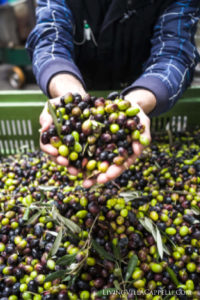 • The corrupt world of extra virgin olive oil and the struggles we face with that. It is definitely a fake food most times.
• The corrupt world of extra virgin olive oil and the struggles we face with that. It is definitely a fake food most times.
• This book covers this topic extensively. Check it out: Extra Virginity
• How by Italian law that even if the olives come from a different country, as long as the oil is bottled in Italy it is allowed to be called “Italian Olive Oil”
• How producers from Tuscany come down to Puglia and buy Puglia olives, then bottle extra virgin olive oil in Tuscany and call it Tuscan olive oil
• How our extra virgin olive oil is really just freshly squeezed olives
• We’ve covered this subject a couple of times in past episodes. Check out:
And click here to sign up for our email course explaining more on how to tell if your extra virgin olive oil is really extra virgin.
Success! Now check your email to confirm your subscription.
Coffee
• Paul wonders why whole bean coffee costs less than ground coffee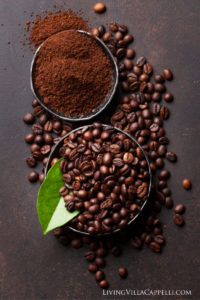
• Paul believes there must be other additives to make it cost less
• After doing a little research, I think there may be other reasons: Namely, inferior beans. Here's what one site had to say:
"Whole bean coffees come from better lots, because it’s impossible to hide negative qualities in a bag of whole bean coffee. Much of the coffee’s aromas and flavors are released when it’s ground. Therefore, customers who purchase whole bean coffee and grind it at home will notice the coffee’s nuanced qualities — regardless of whether they are good or bad.
In comparison, coffee that’s pre-ground has already lost many of its aromatics and flavors by the time the customer purchases it. Thus, it’s not as important to use beans that are highly flavorful and aromatic when selling pre-ground coffee. Roasters that offer ground selections can get away with using lower-quality beans."
• Does anyone have any insight? Let us know in the comments!
• How Paul had a work colleague was bragging about how he makes coffee pods that have 75% pure coffee grounds in the pods
Parmesan Cheese
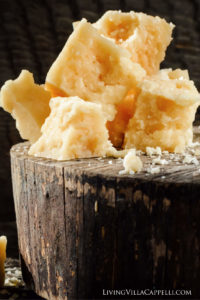 • We did a whole podcast on this here: Why your Italian "food" may not be real food
• We did a whole podcast on this here: Why your Italian "food" may not be real food
• How Parmesan actually is legally allowed to have cellulose (wood pulp) in every jar. Supposedly it is a safe anti-clumping additive when it is only 2-4% of a product. But FDA investigations found 8.8% in some! In some cases ,the cheese was less than 40% of the product!
Wal-Mart has now be slapped with a lawsuit over selling a product labeled as 100% Grated Parmesan but had 7.8% wood pulp!
Truffle oil
• How Paul bought some fresh truffles a few years ago and we made truffle oil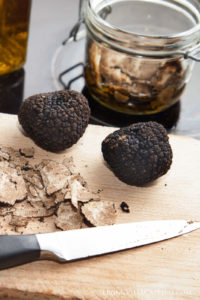
• But then we discovered this can be very very dangerous, and only last 2-3 days
• This sight https://www.idratherbeachef.com/how-to-make-truffle-oil/ goes into it a bit more:
"When you make fresh truffle oil as demonstrated in this post, it has a VERY limited shelf life of two, maybe three days maximum. I suggest making it in small batches to ensure all the oil may be used quickly.
Fresh truffle oil has a limited shelf life due to the oil not being brought and held 212 degrees Fahrenheit, which is the temperature that kills botulism and other bacteria which thrive in an anaerobic environment. Learn more about botulism from homemade canned, preserved or fermented foods.
The truffle oil isn’t brought to 212 degrees because the truffle would start to toast and produce strange flavors. We want truffle oil to embody the essence of the truffle itself, not taste like burnt mushrooms."
• In other words, the extra virgin olive oil you are using to make your truffle oil is only brought up so a low heat to infuse the oil. This low heat infuses the oil but it not hot enough to kill botulism. If it was brought up to that heat it would burn the truffles.
• So unless a chef is making truffle oil as a special for a few nights meals, don't think any Truffle Oil has any real truffles in it. Making it a real fake food.
Wine
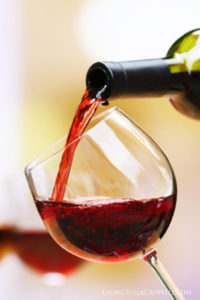 • You can find really cheap wines sometimes
• You can find really cheap wines sometimes
• So when you see something labeled as "Red Wine" is there a rule that says it has to be made with grapes?
• Well, according to the legal definitely, wine's legal definition is according to https://definitions.uslegal.com/w/wine-trade/ is:
"Wine refers to any fermented alcoholic beverage and is generally made from grapes or other fruit. It is mainly used for nonindustrial use."
• Also, wines if they are below 11% alcohol content, you do no have to specify what is in the wine on the label.
Chili Peppers
• We talk a little about our chili crop this year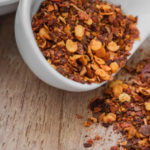
• Paul talks about he believes they put red dye in chili flakes
• You also have no idea how long the chili flakes have been sitting in the bag
Balsamic Vinegar
• What real balsamic vinegar is all about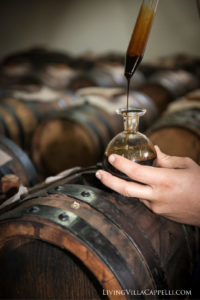
• How regular vinegars are made versus balsamic vinegars
• This is one of what our vendor explained about IGP for balsamic vinegars
• Why it's only made in Modena
There is 2 different types of IGP.
- Industrial IGP produce in Steel silos in maximum 2 month. And in This balsamic vinegar is a mix of vinegar, strong balsamic vinegar, caramel to thicken and colored the balsamic vinegar. And in this silos is put this mix for 2 month to Repose. In the bottom of this silos is “easy found” wood sawdust, to give the effect of the olded balsamic vinegar and the taste of wood. See the steel silos in the pic(this is industrial) Is to easy and quick to obtain the product but is not the original. Is easy to found in all store and supermarket. Especially abroad
- Artigianal IGP (MY BALSAMIC VINEGAR) produce, respect the product specification, and the old process of production. Is put in different wooden barrel of different wood (oak, chestnut, mulberry, juniper, cherry, locust, ash).
This is the barrel use also for DOP (after I explain the DOP ), but there isn’t a battery set (you chose of two different type of barrel) and put the vinegar, with cooked must, to grow old in this barrel, for minimum 5/6 years. And my grandfather They taught to me, “Is impossible buy the time”. You see the picture with wood barrel.
- The DOP is the best of Balsamic vinegar. The product specification, is very strong like Artigianal IGP. You have a wooden barrel, composed to minimum 5 bottle( Example my battery barrel is composed to 5 bottle, you see in 3 pic.) and is possible arrive to the maximum with 12 barrel. Is possible compose your battery with this wood(oak, chestnut, mulberry, juniper, cherry, locust, ash). There is long process to obtain the certification of your wooden Battery, by competent persons and public authority,. And you obtain the first Balsamic vinegar, in 2 step . Step 1 is 12 year old, is called “Affinato” you take a maximum 10 % to the bottle (the little one) which composed your Wooden battery, and after you bring this balsamic vinegar in a special place (Consortium Balsamic Vinegar D.O.P.) when the people check it (see in database when you are register your wooden battery). And in this place The competent person put your balsamic vinegar, in the “Giuggiaro bottle”. Step 2 is 25 year old, is called “extravecchio” “extraold” the process is the same of the 12 year old balsamic vinegar, but you attend 25 years to take it.
Vitamins
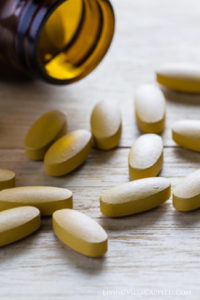 • If you don't know, most vitamins are filled with fillers, like silica (sand)
• If you don't know, most vitamins are filled with fillers, like silica (sand)
• Check the inactive ingredients on any vitamins and you will see they filled with tons of things that are not vitamins
• And for their Vitamin D, they use our extra virgin olive oil as a carrier inside the vitamin
• You can check out Pure Vitamin Club here.
Skim Milk
• We argue a bit about is if really fake or not for consideration in this episode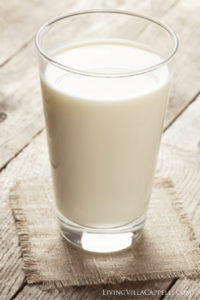
• To Paul's point, they have taken all the good stuff out and now it's really just colored water
• How we only buy whole milk here at the villa
• The podcast Steven mentioned: Food: A Cultural Culinary History Podcast
• Also, how white bread is so over processed that it losses all it's vitamins, so they have to add the vitamins back in. But how if they just didn't over process it, they would have all those vitamins to begin with.
Ham & Turkey
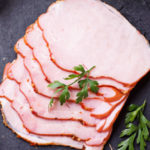 • How most of the ham and turkey you use to make cold cuts is all the remnants of the original animals "glued" back together
• How most of the ham and turkey you use to make cold cuts is all the remnants of the original animals "glued" back together
• That's also called a pressed ham
• The different between prosciutto and and prosciutto crudo
Baby Carrots
• How these are just deformed carrots that are cut down and treated to make baby carrots
• About the guy who invented them, and his other products Bunny Balls
• Paul argues that they are "fake" because they lead you to believe they are grown to be small
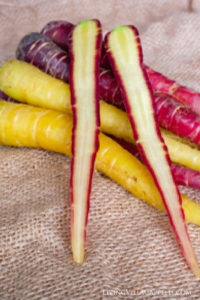 • The multicolored carrots we get here in Puglia
• The multicolored carrots we get here in Puglia
• Why carrots are mostly orange
• And why the Irish hate the color orange on St. Patrick's Day
Juice
• How you really have to check the labels, especially if doesn't say 100% of whatever fruit you are buying.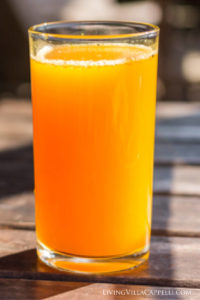
• Most might say 100% juice, but it's a mix of all kinds of different juices, not just the "orange juice" you think you are buying
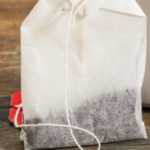 Tea Bags
Tea Bags
• Paul has seen a lot in the news lately about all the bad thing being found in tea bags.
Scallops
• Most scallops are not real scallops, but pressed together fish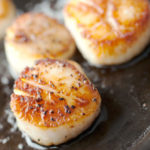
This is the shellac picture I was talking about.
• How I used to add wax to chocolate when making peanut butter balls with my mother. I assumed it was to skip the tempering process. Does anyone know? Let us know in the comments.
• Why eggs are sold non-refrigerated in Italy but sold refrigerated in the states.
- And here's our spicy products we talked about.
To sum up our Real New, Fake Food podcast. Look for real food from the fresh food aisle, not processed food. And be sure to read your labels.
What do you think? Did we miss a fake food? Let us know in the comments!
